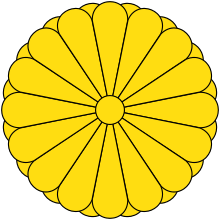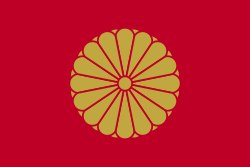Emperor Toba
| Toba | |
|---|---|
| Emperor of Japan | |
 | |
| Reign | 1107–1123 |
| Predecessor | Horikawa |
| Successor | Sutoku |
| Born | February 24, 1103 |
| Died | July 20, 1156 (aged 53) |
| Burial | Anrakuju-in no misasagi (Kyoto) |
Emperor Toba (鳥羽天皇 Toba-tennō, February 24, 1103 – July 20, 1156) was the 74th emperor of Japan,[1] according to the traditional order of succession.[2]
Toba's reign spanned the years from 1107 through 1123.[3]
Genealogy
Before his ascension to the Chrysanthemum Throne, his personal name (his imina)[4] was Munehito-shinnō (宗仁親王).[5]
He was the son of Emperor Horikawa. His mother was Empress Dowager Fujiwara no Ishi (藤原苡子)
Toba had three Empresses, some consort ladys and 14 Imperial sons and daughters.[6]
- 1101–1145 Second Empress (chūgū): Fujiwara no Shōshi/Tamako (藤原璋子), Empress Dowager Taiken (待賢門院), eldest daughter of Fujiwara no Kinzane (藤原公実)
- 1119–1164 Imperial Prince Akihito (顕仁親王), later Emperor Sutoku,
- 1122–1133 Imperial Princess Yoshiko/Kishi (禧子内親王) – Saiin at Kamo Shrine
- 1124–1129 Imperial Prince Michihito (通仁親王)
- 1125–1143 Imperial Prince Kimihito (君仁親王)
- 1126–1189 Imperial Princess Muneko (統子内親王) – Saiin at Kamo Shrine, later married to her brother, Emperor Go-Shirakawa. Named Empress Dowager Zyōsai (上西門院)
- 1127–1192 Imperial Prince Masahito (雅仁親王) – later Emperor Go-Shirakawa
- 1129–1169 Imperial Prince Motohito? (本仁親王), later became a priest under the name Kakushō (覚性法親王)
- 1095–1155 Empress (kōgō) Fujiwara no Yasuko/Taishi (藤原泰子), Kaya no In (高陽院), eldest daughter of Fujiwara no Tadazane (藤原忠実)
- 1117–1160 Empress (kōgō) Fujiwara no Nariko (藤原得子), Empress Dowager Bifuku (美福門院), daughter of Fujiwara no Nagazane (藤原長実); mother of Emperor Konoe.[7]
- 1135–1148 Imperial Princess Toshiko/Eishi (叡子内親王)
- 1137–1211 Imperial Princess Akiko (暲子内親王)
- 1139–1155 Imperial Prince Narihito (体仁親王), later Emperor Konoe
- 1141–1176 Imperial Princess Yoshiko/Shushi (姝子内親王), empress (chūgū to Emperor Nijō)
- Court Lady Ki no Ieko (紀家子), Lady of Mino (美濃局), daughter of Ki no Mitsukiyo? (紀光清)
- 1132–1168 Prince Dōkei (道恵法親王) – Buddhist Priest
- 1134–1181 Prince Kakukai (覚快法親王) – Buddhist Priest
- 11??–1195 Aya Gozen (阿夜御前)
- Lady of Sanjō (三条局), daughter of Fujiwara no Iemasa (藤原家政)
- 11??–1161 Imperial Princess Kenshi? (妍子内親王) – Yoshida saigū (Imperial Princess serving at Ise Shrine)
- Lady of Kasuga (春日局), daughter of Tokudaiji Saneyosi (徳大寺実能)
- 1145–1208 Imperial Princess Shōshi/Nobuko (頌子内親王)
- Lady of Fujitsubo (藤壺女御), daughter of Tachibana no Toshitsuna (橘俊綱)
- Shin-yo? (真誉) – Buddhist Priestess
- Lady of Tosa (土佐局), daughter of Minamoto no Mitsuyasu (源光保)
- Daughter of Fujiwara no Sanehira (藤原実衡)
- Takamatsunomiya (高松宮) (apparently no connection with Arisugawa-no-miya, which was originally named Takamatsu-no-miya)
- Unknown
- Prince Saichū? (最忠法親王) – Buddhist Priest
- Imperial Prince Dōka? (道果親王)
Events of Toba's life
When his mother died, his grandfather, former-Emperor Shirakawa, took him under his care and raised him.
- August 9, 1107 (Kajō 2, 19th day of the 7th month): In the 21st year of Emperor Horikawa-tennō 's reign (堀河天皇21年), the emperor died at the age of 29; and the succession (‘‘senso’’) was received by his only son. Shortly thereafter, Emperor Toba is said to have acceded to the throne (‘‘sokui’’).[8]
During the initial years of Toba's reign, the actual power was held by his grandfather, the "retired" Emperor Shirakawa, in a process known as cloistered rule.
- 1110 (Ten'ei 3, 6th month): The Miidera-ji burned down. This was the second time the temple was destroyed by fire, the first time being in 1081.[9]
- February 25, 1123 (Hōan 4, 28th day of the 1st month): In the 17th year of Emperor Toba's reign (鳥羽天皇17年), Toba was forced to abdicate by his grandfather, retired-Emperor Shirakawa. Toba gave up the throne in favor of his son Akihito, who would become Emperor Sutoku. Toba was only 21 years old when he renounced his title; and he had already reigned for 16 years: two in the nengō Tennin, three in Ten'ei, five in the nengō Eikyū, two in Gen'ei, and four in the nengō Hōan. At this time, Toba took the title Daijō-tennō.[10] The succession (senso) was received by a his son.[11]
- 1123 (Hōan 4, 2nd month): Emperor Sutoku is said to have acceded to the throne (sokui).[12]
- 1129 (Daiji 4): Emperor Shirakawa died; and Toba himself began to rule as cloistered emperor. Toba continued to hold power through the reigns of three emperors, Emperor Sutoku, Emperor Konoe, and Emperor Go-Shirakawa.
- 1134 (Chōshō 3): The former-Emperor Toba made a pilgrimage to the Kumano Shrines. He was accompanied by sadaijin Hanazono no Arahito and udaijin Naka-no-in Munetada. The excursion was enjoyed by all, and great quantities of sake were consumed.[13]
Kugyō
Kugyō (公卿) is a collective term for the very few most powerful men attached to the court of the Emperor of Japan in pre-Meiji eras. Even during those years in which the court's actual influence outside the palace walls was minimal, the hierarchic organization persisted.
In general, this elite group included only three to four men at a time. These were hereditary courtiers whose experience and background would have brought them to the pinnacle of a life's career. During Toba's reign, this apex of the Daijō-kan included:
- Sesshō, Fujiwara Tadazane, 1078–1162.[6]
- Kampaku, Fujiwara Tadazane.[6]
- Kampaku, Fujiwara Tadamichi, 1097–1164.[6]
- Daijō-daijin, Fujiwara Tadazane.[6]
- Sadaijin, Fujiwara Tadamichi.[6]
- Sadaijin, Hanazono no Arahito.[9]
- Udaijin, Naka-no-in Munetada.[9]
- Naidaijin
- Dainagon
Eras of Toba's reign
The years of Toba's reign are more specifically identified by more than one era name or nengō.[14]
- Kajō (1106–1108)
- Tennin (1108–1110)
- Ten'ei (1110–1113)
- Eikyū (1113–1118)
- Gen'ei (1118–1120)
- Hōan (1120–1124)
See also
Notes

- ↑ Imperial Household Agency (Kunaichō): 鳥羽天皇 (74)
- ↑ Ponsonby-Fane, Richard. (1959). The Imperial House of Japan, pp. 79.
- ↑ Titsingh, Isaac. (1834). Annales des empereurs du Japon, pp. 178–181; Brown, Delmer et al. (1979). Gukanshō, pp. 320–322; Varley, H. Paul. (1980). Jinnō Shōtōki. pp. 203–204.
- ↑ Brown, pp. 264. [Up until the time of Emperor Jomei, the personal names of the emperors (their imina) were very long and people did not generally use them. The number of characters in each name diminished after Jomei's reign.]
- ↑ Titsingh, p. 178; Brown, p. 320; Varley, p. 203.
- ↑ 6.0 6.1 6.2 6.3 6.4 6.5 Brown, p. 321.
- ↑ Kitagawa, Hiroshi. (1975). The Tale of the Heike, p. 240.
- ↑ Titsingh, p. 178; Brown, pp. 320; Varley, p. 44. [A distinct act of senso is unrecognized prior to Emperor Tenji; and all sovereigns except Jitō, Yōzei, Go-Toba, and Fushimi have senso and sokui in the same year until the reign of Emperor Go-Murakami.]
- ↑ 9.0 9.1 9.2 Brown, p. 322.
- ↑ Brown, pp. 320–321; Titsingh, p.181.
- ↑ Brown, p. 322; Varley, p. 44.
- ↑ Titsingh, p. 182; Varley, p. 44.
- ↑ Brown, p. 322 n56.
- ↑ Titsingh, pp. 177–181; Brown, p.321.
References
- Brown, Delmer M. and Ichirō Ishida, eds. (1979). Gukanshō: The Future and the Past. Berkeley: University of California Press. 10-ISBN 0-520-03460-0; 13-ISBN 978-0-520-03460-0; OCLC 251325323
- Kitagawa, Hiroshi and Burce T. Tsuchida, ed. (1975). The Tale of the Heike. Tokyo: University of Tokyo Press. ISBN 0-86008-128-1 OCLC 164803926
- Ponsonby-Fane, Richard Arthur Brabazon. (1959). The Imperial House of Japan. Kyoto: Ponsonby Memorial Society. OCLC 194887
- Titsingh, Isaac. (1834). Nihon Odai Ichiran; ou, Annales des empereurs du Japon. Paris: Royal Asiatic Society, Oriental Translation Fund of Great Britain and Ireland. OCLC 5850691
- Varley, H. Paul. (1980). Jinnō Shōtōki: A Chronicle of Gods and Sovereigns. New York: Columbia University Press. 10-ISBN 0-231-04940-4; 13-ISBN 978-0-231-04940-5; OCLC 59145842
| Regnal titles | ||
|---|---|---|
| Preceded by Emperor Horikawa |
Emperor of Japan: Toba 1107–1123 |
Succeeded by Emperor Sutoku |
| ||||||||||||||||||||||||||||||||||||||||||||||||||||||||||||||||||||||||||||||||||||||||
